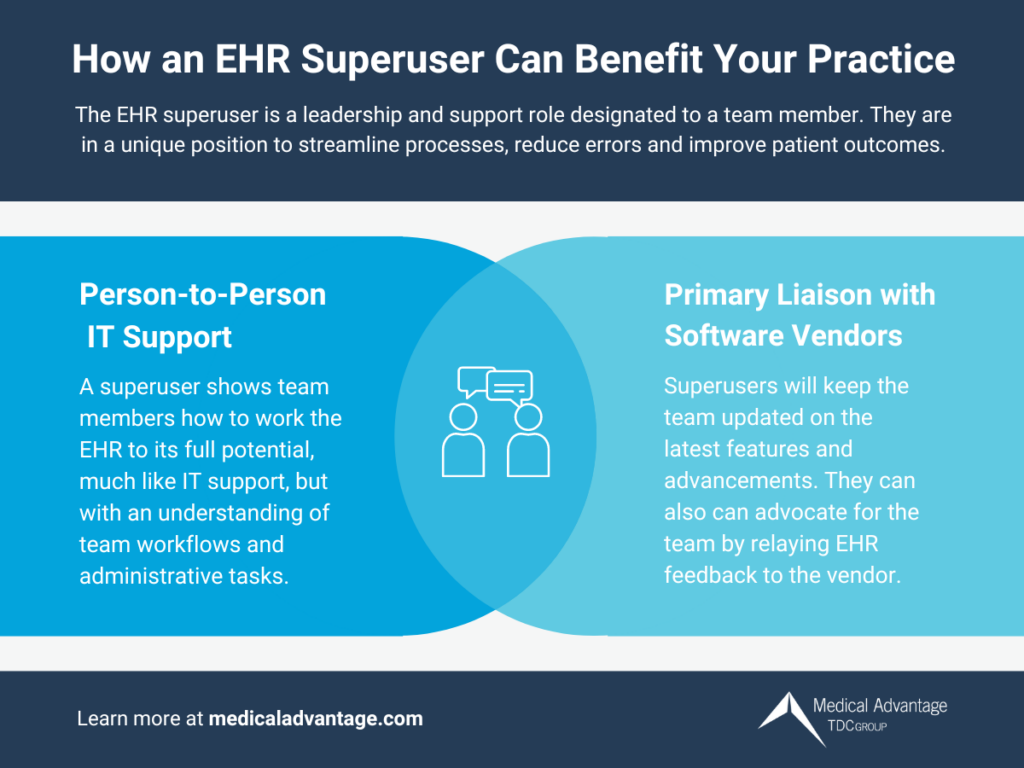With electronic health record (EHR) systems , it is not a question of if users will run into issues with the interface – it is a question of when. The more prepared a healthcare organization is for these intermittent interruptions, the better. To have the support needed for these instances, having a superuser is a prime asset for your team.
What Is a Superuser by Definition?
Superuser is a term that has been used in the technology industry for some time now, but those in other sectors may be asking, “What is a superuser?” Technopedia defines the superuser as, “A superuser is a special user account for general system administration such as in networks and databases.”
However, a superuser is more than just a special account with maximum privileges. The superuser is a role designated to a team member who is best suited for all the responsibilities it entails. This is a support role, but it also is a team leadership role.
Staff members can look to the superuser as a go-to expert for guidance and troubleshooting. The superuser can also train new hires or retrain those whose roles may change within the practice.
How an EHR Superuser Can Benefit Your Practice
On any given day, users of the EHR will run into issues that bring workflows to a halt or interfere with patient flow. A superuser can help iron out these disruptions with person-to-person support. They also can show team members how to work out the quirks so that they can use the EHR to its full potential. A superuser is like IT support, but with an understanding of team workflows and administrative tasks.
Depending on team size, an organization may need more than one superuser. If there are several staff members willing to commit themselves as a superusers, the knowledge and responsibility can be spread across many roles, (i.e., a superuser for the front desk, a superuser for nurse/medical assistant, and a superuser for physicians).
The Higher Level of Administrative Involvement of Superusers
Superusers play a critical role in the successful implementation and utilization of EHR systems. Because of the extensive knowledge they have acquired, superusers are key stakeholders to consult about major decisions regarding the EHR.
By serving as a primary liaison with software vendors, EHR superusers will keep the team updated on the latest features and advancements. They also can advocate for the team by relaying EHR feedback to the vendor. EHR superusers are in a unique position to streamline processes, reduce errors and improve patient outcomes.
What Are the Roles and Responsibilities of a Superuser in Healthcare Settings?
The primary purpose of a superuser is to facilitate the best EHR user experience for the entire team. A superuser may be designated for any given medical practice software, but one of the more common scenarios is a need for an EHR superuser. An EHR superuser is a person within the practice who has a deep understanding of the EHR system and best practices for workflows.
In addition to providing on-the-spot support as needed, superusers can also coach colleagues on best practices. For example, system security is a constant concern for healthcare organizations in light of potential data breaches or unauthorized intrusion. Superusers can take the lead on instilling good habits that keep the EHR protected from security threats.
It is recommended superusers attend all trainings and stay informed of system updates. It is then their responsibility to provide the rest of the staff with updated information. Keeping the staff informed with pertinent operating system updates will help prevent end-users from falling behind and becoming frustrated with the EHR.
Criteria for Selecting a Superuser
So, who in the team should be given the superuser account? While some practices ask for volunteers, others will selectively appoint superusers. Because your EHR superuser plays a vital role in helping the whole organization get the most out of their EHR experience, it is best to choose the right person. Here are traits to consider when selecting this user.
- Extensive experience with EHR systems
- Deep understanding of the practice workflow
- Strong technical skills
- Good people skills
- Adept at leading, coaching, and training
- Excellent communicator Well-trusted among peers
- Self-motivated
- Learns easily and can keep up with ongoing EHR system updates
- Positive attitude and discipline that wins and maintains staff buy-in
- Availability and dexterity to pivot between their primary clinical role and the superuser role
Important Considerations Regarding Superusers in Healthcare
The superuser account is typically the one with the most credentials and expanded access. One EHR best practice is to train a user only on the features they will use. A superuser – on the other hand – will go through extensive training so that they understand the workflows for everyone’s role.
Allowing flexibility in this role is key. The superuser must have the “wiggle room” to respond to EHR issues as they arise. For example, if a tenured nurse serves as the superuser, there should be an understanding that their responsibilities will be handed over to another nurse while they assist with an EHR support matter.
One important thing to keep in mind with the EHR super user is that their experience and prowess are highly sought after by recruiters in the industry. For that reason, you should compensate and support them in a way that will cultivate retention.
Summary of Superusers in Healthcare
What is a superuser? In general terms, a superuser is one who has ownership of an administrative account. However, in the context of healthcare, the superuser is a hybrid role in the medical practice. Rather than hire someone separately, a current member of the practice team is designated for this role. The superuser is tasked with helping, coaching, and training the staff.
Because of the substantial responsibilities a superuser will take on, it is important to select one who has the experience and soft skills the role requires. The overall purpose of a superuser is to help the team have the best user experience with healthcare software – usually with the electronic health records (EHR) system. This role is critical for the efficiency for workflows and patient flow.

Equip Your Superuser for Success with Expert EHR Training
When it comes to implementing and utilizing an EHR, every member of your medical team needs sufficient training to use the system to the top of their licensure. But the superuser will need much more extensive training to prepare for all the additional responsibilities.
Medical Advantage helps healthcare organizations – from individual practices to large groups – provide the best EHR training. Choose the format according to your practice needs whether it is remote, in-person, short-term, or long-term. Our team of seasoned EHR trainers are prepared to give your superusers everything they need to thrive in this critical role. Reach out to us today for more information or with any EHR training questions.





